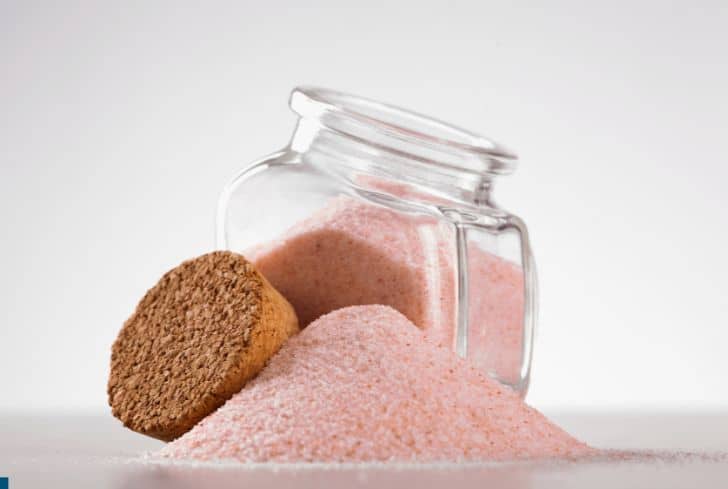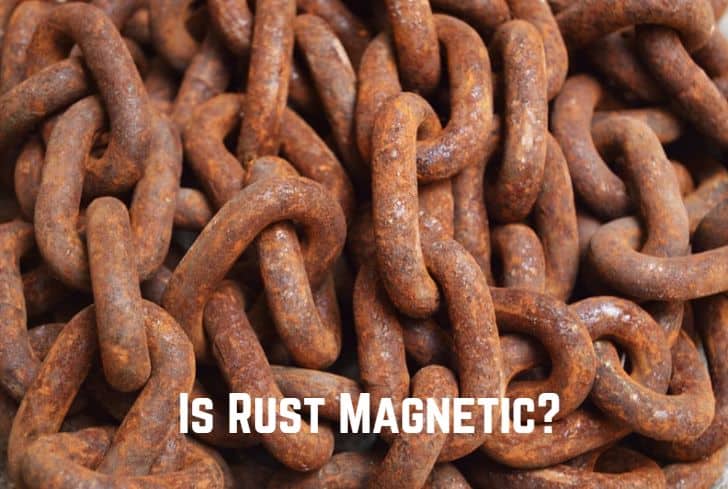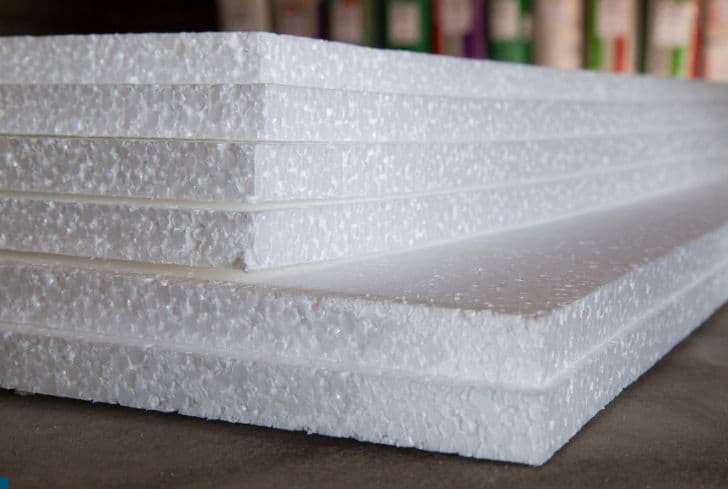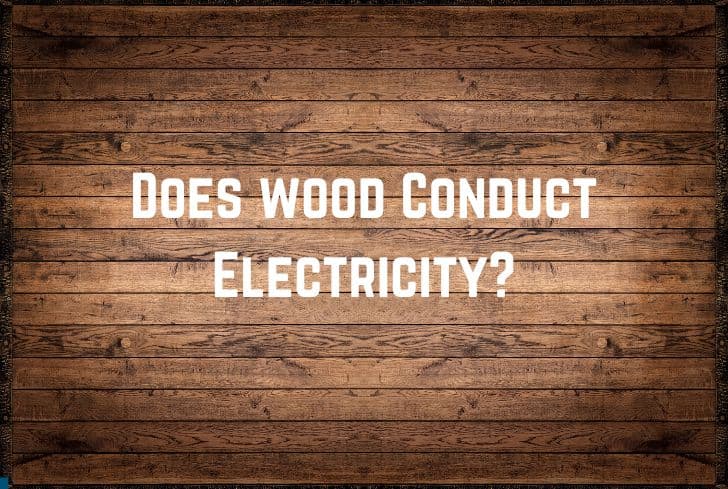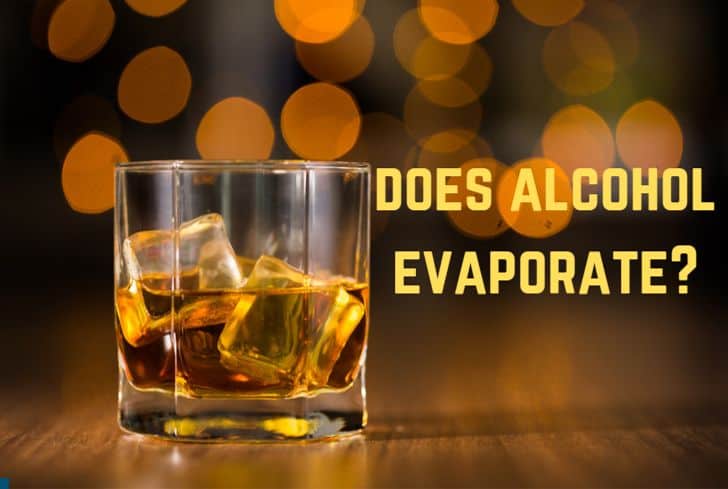Does Brake Fluid Evaporate? (Yes. It Can)
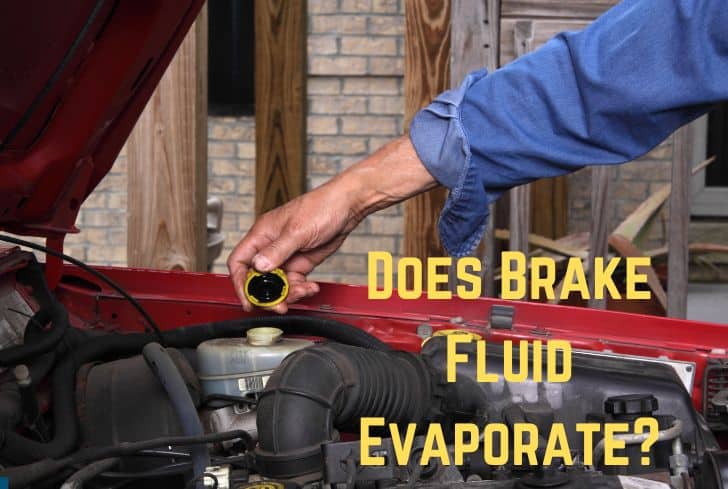
If you want to drive safely, the brake fluid in your vehicle is a vital component of the system. You should be alarmed if you observe a drop in brake fluid amount. There are various causes for this, and evaporation might be one of them. But does brake fluid evaporate?
We will answer that question and outline brake fluid components for you. We will also tackle the issue of whether brake fluid gradually evaporates on the ground. Knowing what causes brake fluid to evaporate and how to stop it will be essential for you to know. We also answer the question of how long you can drive with low brake fluid.
Can Brake Fluid Evaporate?
Yes, brake fluid can evaporate. It should be negligible unless there is a problem with the brake system. Since brake fluid is supposed to be volatile, it shouldn’t evaporate as quickly as other fluids. Therefore, if you observe a decrease in brake fluid, you should check the brake system leaks or worn brake pads.
The amount of brake fluid should stay the same unless there is a leak because the system is tightly sealed. Its evaporation can result in a soft pedal and a braking system that isn’t working correctly. The evaporating brake fluid leaves behind a film on the brake discs and pads, causing them to wear down fast.
What is Brake Fluid Made of?
The majority of brake fluids are a mix of various glycols, the majority of which are non-petroleum and other alcohol based fluids. Certain brake fluids contain high-grade silicon-based fluids that must not be combined with any other fluids. Brake fluids are available in a variety of forms, but they all need to comply to certain standards.
The brake fluid needs to have a high boiling point as one of its requirements. That is primarily done to handle your car’s brakes, which can reach temperatures of 1200 degrees. Because of the seasonal changes that affect vehicles as well, brake fluids must also have low freezing points. Additionally, the brake fluid must not significantly damage the parts of the car.
There are three types of brake fluid based on composition.
- Caster oil-based brake fluid comes in two different varieties: DOT 2 and pre-DOT. Caster oil and alcohol are combined in these two fluids. Either butanol or ethanol could be the alcohol.
- Silicon-based: DOT 5 standard brake fluid is one type of silicon-based brake fluid you may come across. Tributyl phosphate, Di-Ethylhexyl sebacate, and Dimethylpolysiloxane make up this combination.
- Glycol-based: The fluids with a glycol basis are DOT 3,4,5.1. Polyethylene glycol, triethylene glycol, alkyl esters, and diethylene glycol are among the major components.
Does Brake Fluid Evaporate on the Ground?
On the ground, spilled brake fluid will eventually evaporate. It is exposed to the air, which is one reason, and it could contain alcohol, which is another. The color of brake fluid on the ground will either be light yellowish or dark brown, resembling motor oil. Brake fluid on the ground will quickly evaporate on a hot day.
The best course of action, however, is to wipe the brake fluid as soon as you see a spill. The concrete ground may not be significantly damaged, but a stain will be left. However, a brake fluid spill can do a lot of harm on asphalt. Although the brake fluid might evaporate, enough damage will have already been done.
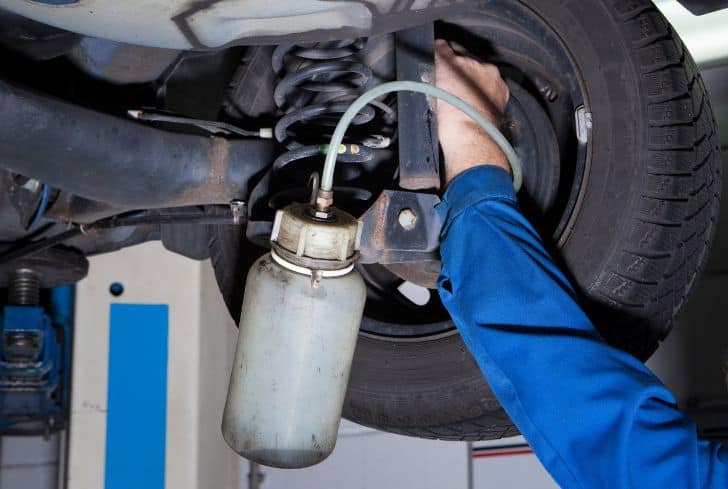
Does Brake Fluid Evaporate Over Time?
Evaporation of brake fluid over time will depend on the kind of brake fluid you’re using. You must keep in mind that different brake fluids have different chemical compositions. The state of your car’s brake system will also affect how quickly brake fluid evaporates. It is very likely that brake fluid will evaporate over time if the system has leaks.
If your brake fluid has a high boiling point, there is a high chance that it won’t evaporate quickly. One of the basic requirements of quality brake fluid is that it should have a high boiling point. Ideally, brake fluid should evaporate slowly over time and its evaporation rate should be negligible.
Alcohol evaporates at a fast rate. If your brake fluid contains alcohol, evaporation will probably happen more quickly. But in most circumstances, evaporation of brake fluid will occur if the fluid is left in the open.
Low quality brake fluid can evaporate over time. In the market, there are always products that are fake, cheap, and illegal. These products are probably made of poor-quality oil and alcohol, both of which are likely to evaporate. If you buy such brake fluid products, evaporation will eventually take place.
What Causes Brake Fluid To Evaporate?
Ideally, brake fluid should not evaporate at all. However, if it occurs, it should only be a moderate discharge that is primarily caused by leaking. However, a rise in temperature might cause brake fluid to evaporate. The fluid particles will become relatively light to quickly evaporate at extremely high temperatures. The amount that will evaporate, though, won’t be enough to damage your brakes.
Another reason why brake fluid evaporates is corrosion in the brake lines. Blake fluid is transferred from the master cylinder to the brake callipers via brake lines. Brake fluid will be exposed to the air if the brake lines are defective, which will cause evaporation.
Find out how a car is losing the brake fluid:
How Can I Stop Brake Fluid From Evaporating?
It might be tough to stop evaporation completely, but you can try to take several measures.
- Temperature
You can start by ensuring that the temperature of the brake fluid does not rise to abnormal levels. That is only possible when you frequently change any damaged or worn-out brake pads. Damaged brake pads are unable to avert any excessive heat build-up. Heat will make your car’s brake fluid evaporate.
- Moisture
Prevent moisture from coming into touch with the brake fluid. Avoid exposing DOT 3 and DOT 4 to water if you are using these products since they can absorb water. Moisture will cause the boiling points of the brake fluid to drop, increasing the speed their evaporation.
How Long Can You Drive With Low Brake Fluid?
The amount of brake fluid in your vehicle will determine how far you can drive with low brake fluid. You cannot drive the vehicle at all if the brake fluid level is too low and you can’t apply the brake pressure. However, if there is enough brake fluid for you to apply pressure, you can drive as long as the fluid stays above that level.
It’s crucial to check the fluid levels frequently while driving a car with low brake fluid levels. There is a high risk that while you drive, your brake fluid will run out. However, if the brake fluid is low but still sufficient to drive your car, you can do so for a few hours.
However, it would not be advisable to drive your car without a brake fluid refill if the brake warning light has been on for some time. Additionally, keep in mind that driving with low brake fluid puts your brakes at risk for malfunction. Driving while your brakes aren’t working properly can be quite risky.
Your car’s brakes assist you in safely slowing down. You will rely on the brakes in an emergency to keep you from crashing. Therefore, if your brake fluid is low but you want to continue driving your car, it would be smarter to refill.
How can you tell if your brake fluid is low. Here are some telltale signs:
- There’s a brake fluid leak under your car.
- The ABS warning light is on.
- Your brake pedals appear to be soft and spongy.
- Your car’s brake pads are worn out.
Frequently Asked Questions
Can brake fluids get low without a leak?
Without a leak, a car’s braking fluid level could drop. That typically occurs when the brake pads, discs, and drums are worn out. Due to the worn out parts requiring the brake fluid to fill the space, the brake pistons will have to move further.
It is always good to have your mechanic inspect your car whenever you suspect a brake issue. The mechanic will examine the leak’s cause and any worn-out parts.
Why is my brake fluid boiling?
When you drive your vehicle in areas where enhanced braking is necessary, heat is transferred to the caliper, raising the temperature of the brake fluid. The boiling point of brake fluid will drastically fall if it has moisture. The lower boiling point and increased temperature make it simpler for the brake fluid to boil.
Bubbles will appear in the brake system when the brake fluid boils. The brake pedal will hit the floor abruptly without the vehicle slowing down as a result of the air bubbles compressing while braking.
Conclusion
Brake fluid should not evaporate and if it does it should be a negligible amount. To avoid lowering the fluid’s boiling point, try to keep the brake fluid from coming into touch with moisture. The rate of evaporation rises as the boiling point of the brake fluid is lowered.

